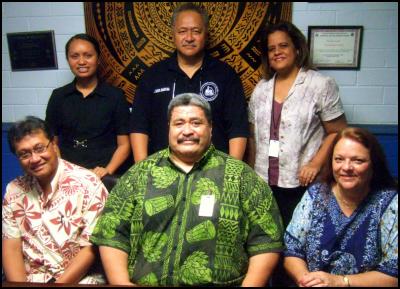ACCJC/WASC Removes ASCC from “Warning” Status
ASCC PRESS RELEASE
Monday,
February 07, 2011
ACCJC/WASC Removes ASCC from “Warning” Status and Reaffirms Full Accreditation
By James Kneubuhl, ASCC Press Officer
After two years of diligent effort to satisfy the stated criteria of the Accrediting Commission for Community and Junior Colleges (ACCJC), a division of the Western Association of Schools and Colleges (WASC), the American Samoa Community College (ASCC) has received confirmation of its success. In a letter dated January 31st of this year from ACCJC President Dr. Barbara Beno, ASCC is listed among institutions now removed from the “Warning” category, and whose accreditation has been reaffirmed. “We expect to receive follow-up communications from ACCJC/WASC pertaining to our individual institution and what steps they recommend we take to remain in good standing,” said ASCC Accreditation Liaison Officer Dr. Kathleen Kolhoff-Belle. “For the moment, our inclusion on the list of institutions removed from ‘Warning’ status and with reaffirmed accreditation means that all of our efforts over the last two years have given us the results we hoped for.”
In February 2009 the ACCJC/WASC Commission informed ASCC that it had been placed on probation pending the resolution of issues raised in ten recommendations by an October 2008 visiting team, as well as one additional recommendation by the Commission itself. During this probationary period, the College’s accreditation provisionally remained in full effect, while teams of ASCC administrators and faculty worked to address the ACCJC/WASC recommendations. ACCJC/WASC representatives made two follow-up visits in March and October 2010, and on both occasions the visiting teams remarked that ASCC had made progress ahead of the previously established timetable for addressing the recommendations. At the conclusion of the November visit, representative Dr. Mark Zacovic told an ASCC audience that based on his team’s findings the College had “successfully completed addressing all recommendations”, although the official change in its status would come from the ACCJC/WASC Commission scheduled to meet in January.

Having received the good news from the Commission, the many ASCC administrators, administrative support staff, faculty, students and community members who dedicated themselves to addressing the ACCJC/WASC recommendations now share a feeling of celebratory satisfaction. “This bears testimony to what we can accomplish working together,” said ASCC President Dr. Seth Galea’i. “This process gave us an opportunity to clarify our focus as an institution, and to reaffirm the importance of adopting best practices based on data-driven standards as articulated by the Accrediting Commission. With our accreditation issues now resolved, we can return our attention to priority projects such as our four-year Teacher Education degree, which is now poised to move ahead at full speed.”
In addition to everyone at ASCC who worked for the better part of two years on the ACCJC/WASC recommendations, President Galea’i gave special recognition to Governor Togiola Tulafono for his assistance during this period. “The Governor kept tabs on our progress and offered his help in any way he could,” said the President, “while at the same time giving us the latitude to make our own decisions.” President Galea’i also commended the Board of Higher Education and chairman Uta Dr. Laloulu Tagoilelagi for their leadership and support, and thanked the Fono leadership, specifically Legislator Lemapu Talo, chairman of the Education Committee, for attending all meetings between the Board and the visiting ACCJC/WASC teams.
Work to address the ACCJC/WASC recommendations progressed even while the College underwent a period of unprecedented change and growth. “Many recent developments took place at the same time,” President Galea’i reflected. “Our enrollment peaks over the past few semesters indicated a greater demand for what ASCC offers, so we expanded our curriculum to include our first night classes. Also, our Trades & Technology Division opened its Apprenticeship and Re-Train programs to assist workers displaced by the cannery closures. ARRA funding has enabled us to make plans for modern learning technology such as ‘smart classrooms’ and campus-wide Wi-Fi. We initiated a number of energy saving measures, such as our first solar panels for part of the campus. Even with the ACCJC/WASC challenge now behind us, we have many new developments to focus on, but I’m sure the insights we gained from the accreditation-related process will prove invaluable as we move ahead.”
ENDS


 NZ Principals Federation: Principals Describe Budget As Bitter Sweet
NZ Principals Federation: Principals Describe Budget As Bitter Sweet GfK Radio: Radio Listening Tops 3.5M Weekly Listeners
GfK Radio: Radio Listening Tops 3.5M Weekly Listeners  Jacob Douglas Motorsport: Douglas Heads To The Oval After Breakthrough Victory
Jacob Douglas Motorsport: Douglas Heads To The Oval After Breakthrough Victory Research For Maori Health and Development: Bridging The Gap In HIV Prevention For Māori - Insights And Resources Now Available
Research For Maori Health and Development: Bridging The Gap In HIV Prevention For Māori - Insights And Resources Now Available Tertiary Education Union: Weltec And Whitireia Cuts A Shocking Blow For Their Communities
Tertiary Education Union: Weltec And Whitireia Cuts A Shocking Blow For Their Communities PHARMAC: Pharmac Proposes To Fully Fund Nutrition Replacements For Some People With Crohn’s Disease
PHARMAC: Pharmac Proposes To Fully Fund Nutrition Replacements For Some People With Crohn’s Disease